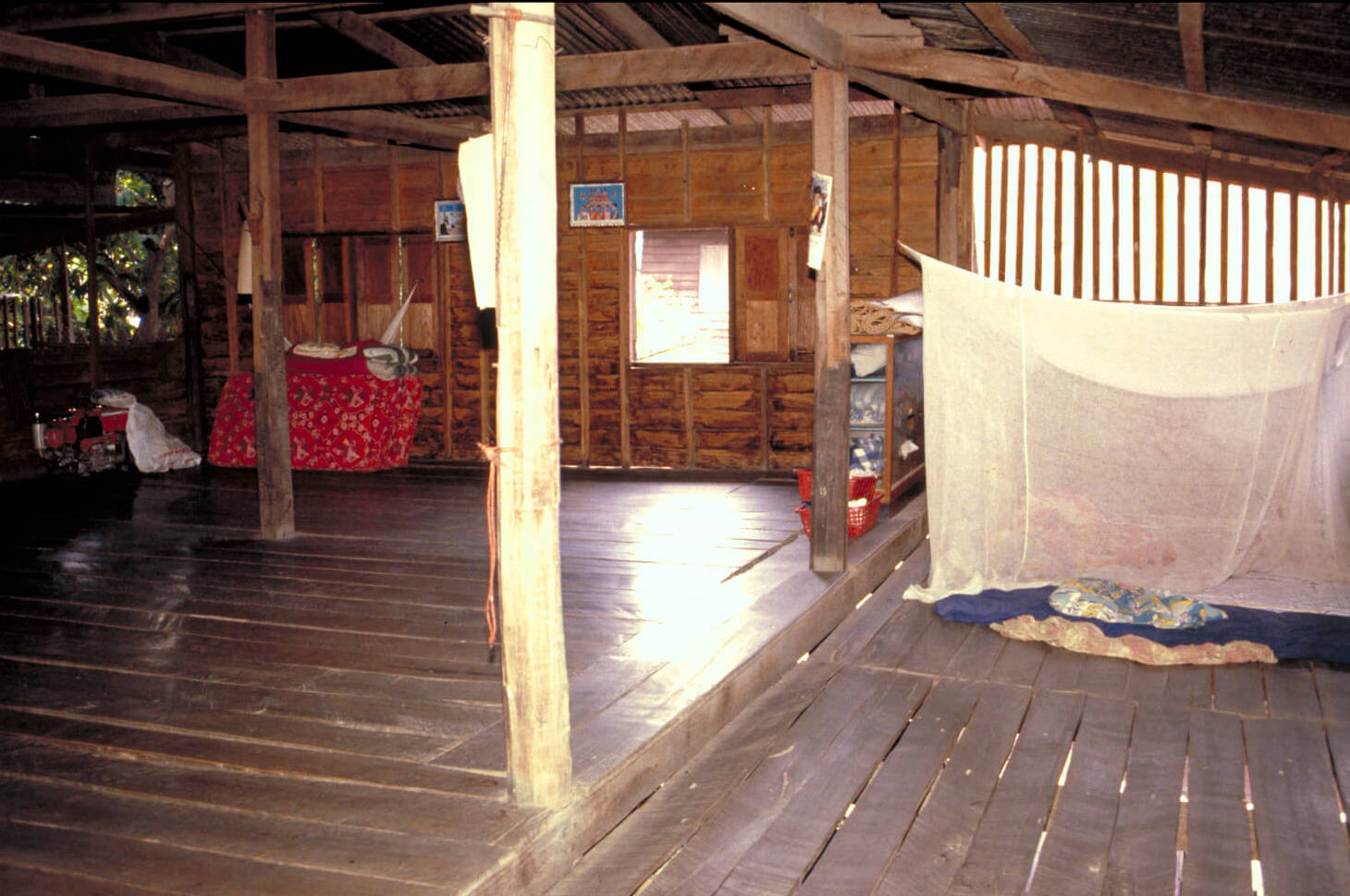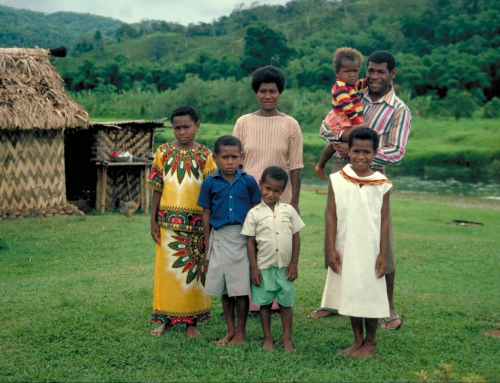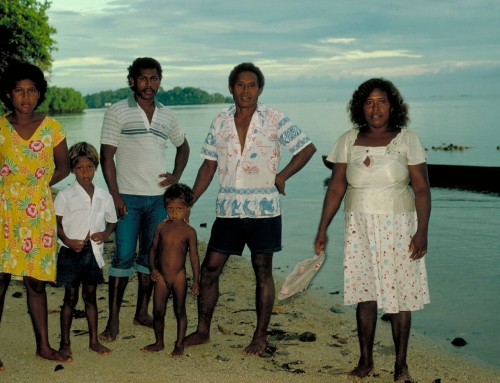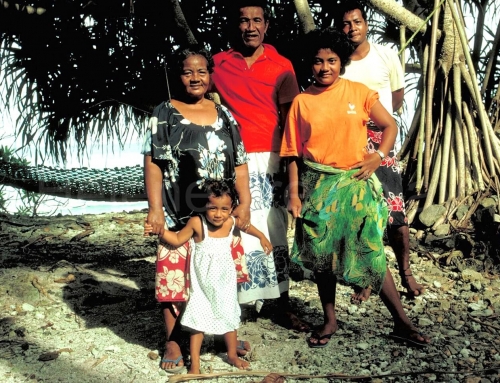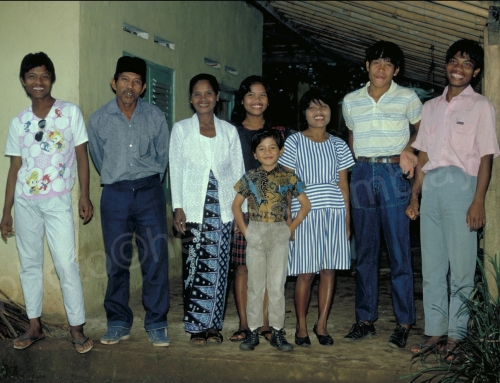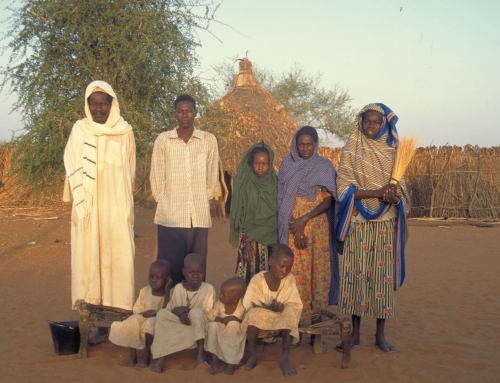
The Sutrong family
Soan Sutrong aged 63
Kao Sutrong, 62
Get Yoddumnern (son-in-law) 30
Taptim Yoddumnern, 26
Kanchai, 7
Yukun, 5
Chacharin, 8 months
11 pigs and piglets
5 ducks
3 hens
3 dogs
Hangku
November 15
A cock crows without conviction
4:15 In the flatlands at the heart of Thailand, a cock crows without too much conviction. But that is enough to put the energetic Taptim right on her feet. She crosses the 200 square metre room, whose space is divided by two mosquito nets that cover the family’s two sleeping mats. Her parents sleep on one with seven- and five-year-old Kanchai and Yukun; the other is for Taptim, her husband Get and their baby.
Taptim switches on the light over the kitchen area of the teak wood house. The sounds of her steps, as she lights the charcoal fire, and the pounding of her wooden mortar and pestle, as she grinds the spices for breakfast, dispel the lingering silence of the night and chase the rats back to the rice fields.
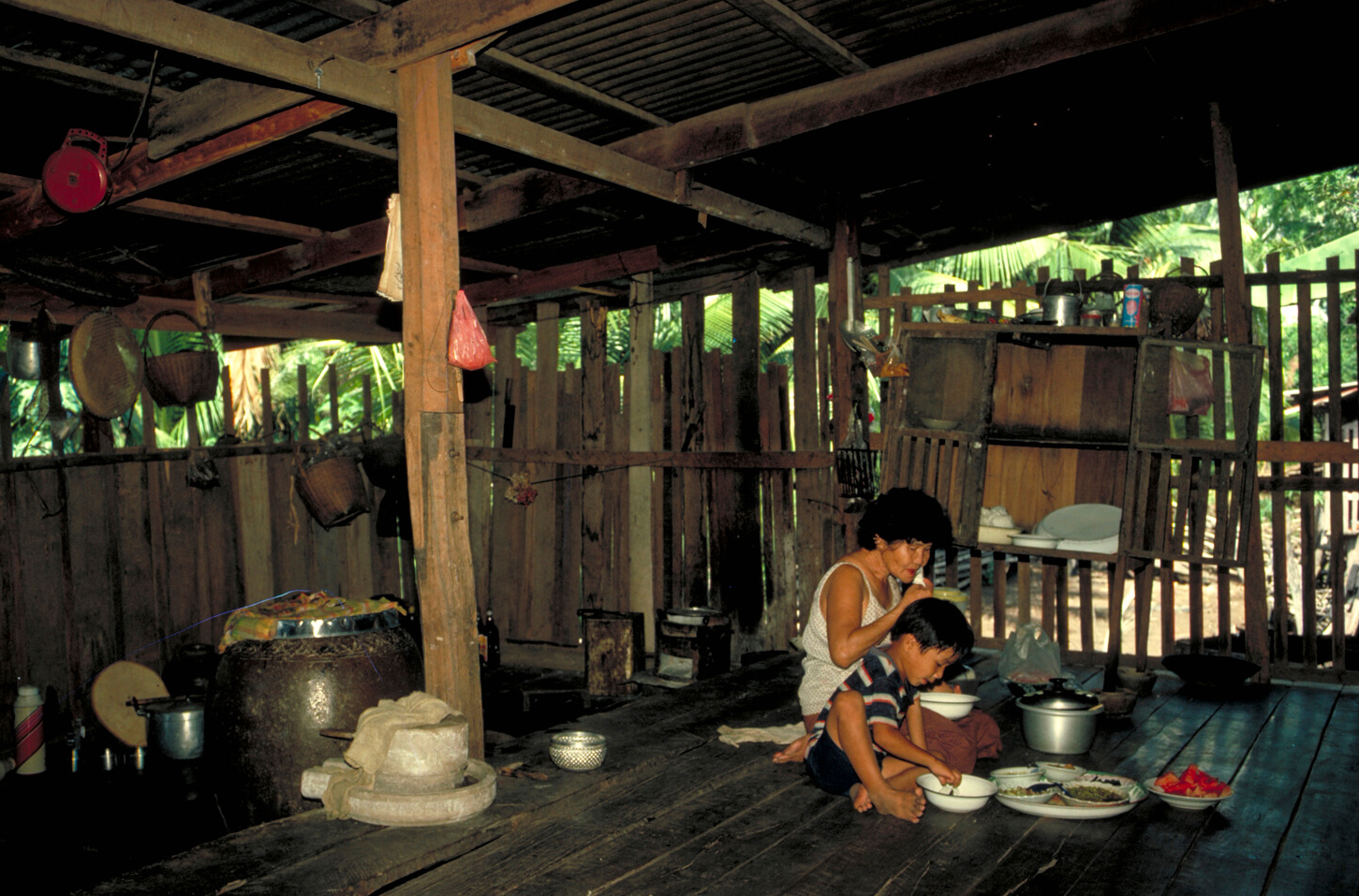
“I thought when I was very young that land was the best thing I could buy,”
5:30 Next door, a baby cries. Taptim’s husband starts the first of many trips to the small river nearby to fill up the cement cistern in the backyard bathing and latrine shed. One year from now, Soan expects to be able to afford running water. Clouds begin to hide what little blue sky there was to see. The rain they will bring is welcome in this part of the country, where peasants have no irrigation systems. “Unlike the past two years, this year there will be a good harvest and profits for all,” say Taptim and Get. However, the family will have to work hard for any profit. Soan owns 70 rai (1 rai= 1,600 square metres), three times what most peasants are able to rent from the country’s rich landlords, who continue to buy more and more land as peasants move to the cities. Soan decided to buy it 30 years ago, when 80 percent of the country’ s peasants still owned their land. “I thought when I was very young that land was the best thing I could buy,” he says, proud of his youthful decision.
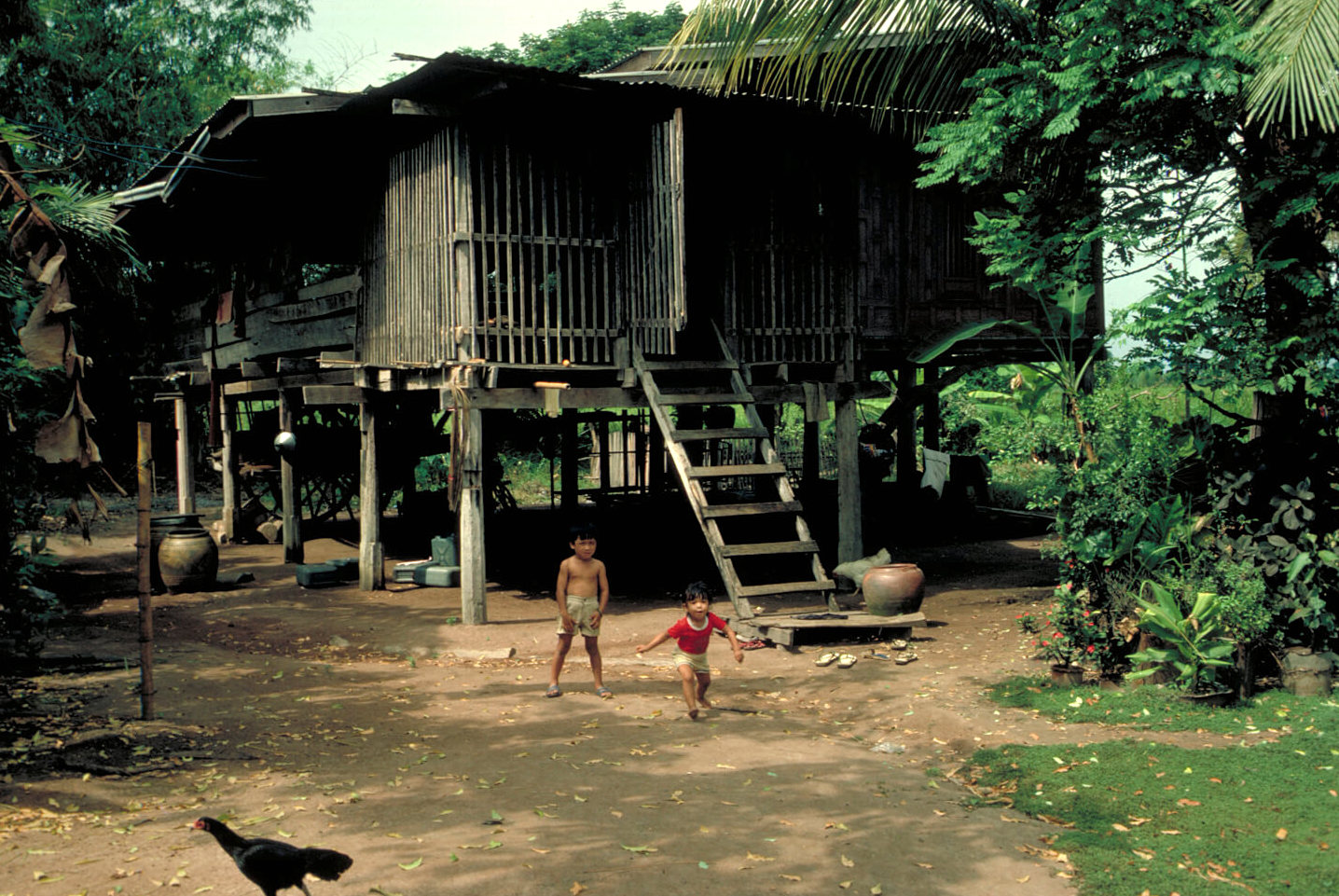
Kao’s only source of relief for the toothaches
5:45 Kao crawls out of her mosquito net, shakes her legs, prays to Buddha and takes one of the many straw baskets hooked to the inside walls. She sits cross-legged, opens a plastic bag from inside her basket and spreads some white powder and a betel nut on a bae pu leaf (a sort of tobacco). She rolls up the leaf and pops it in her mouth to chew. The betel nut is a narcotic, which numbs the mouth and was originally Kao’s only source of relief for the toothaches she suffered. The daily chewing has stained her mouth permanently red.
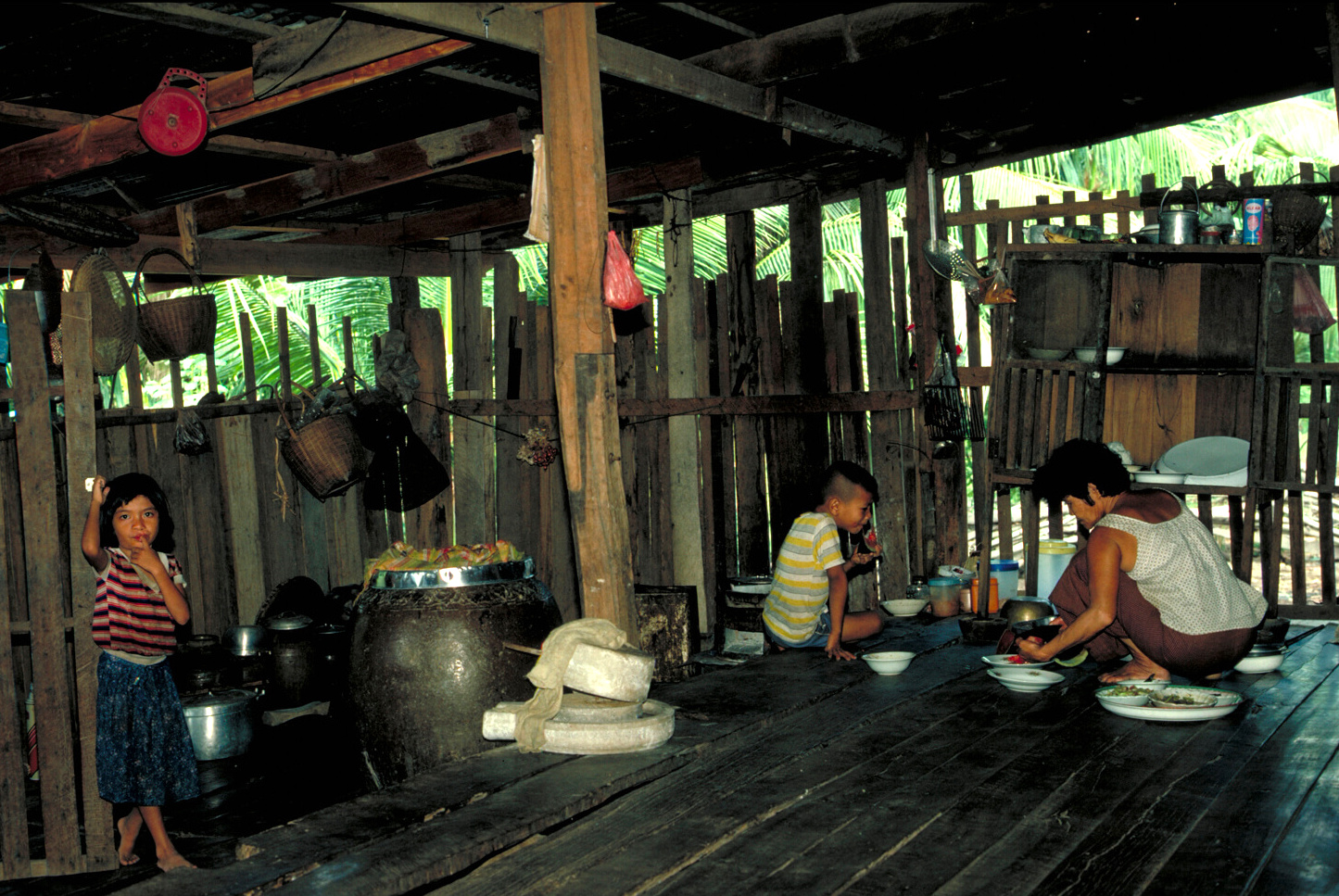
Rice for Buddha
6:15 Rice is presented to the Buddha on the family altar. Then the meal Taptim has prepared is put in tiffins- a set of stacked round metal boxes- and secured in straw baskets. Although Taptim and Get own a motorcycle, they rush across the small family hamlet to the road to jump on the back of a farm truck already waiting for them. Other farm workers, mostly friends, cousins and brothers, have piled in. The small group has hired themselves out to harvest manioc on a larger farm, as there are still about 10 more days until the rice harvest. The truck pulls out of the quiet village, passing the monks coming with their begging bowls. As they leave the main district road and head onto dirt roads, the low red sun peers out of the clouds and intensifies the green and gold hues of the fields.
A bumpy half an hour later, the workers jump out of the truck. Men unload the tools, while the women lay down a plastic tablecloth and spread out plates and the rice, smoked fish and hot sauce in their baskets.
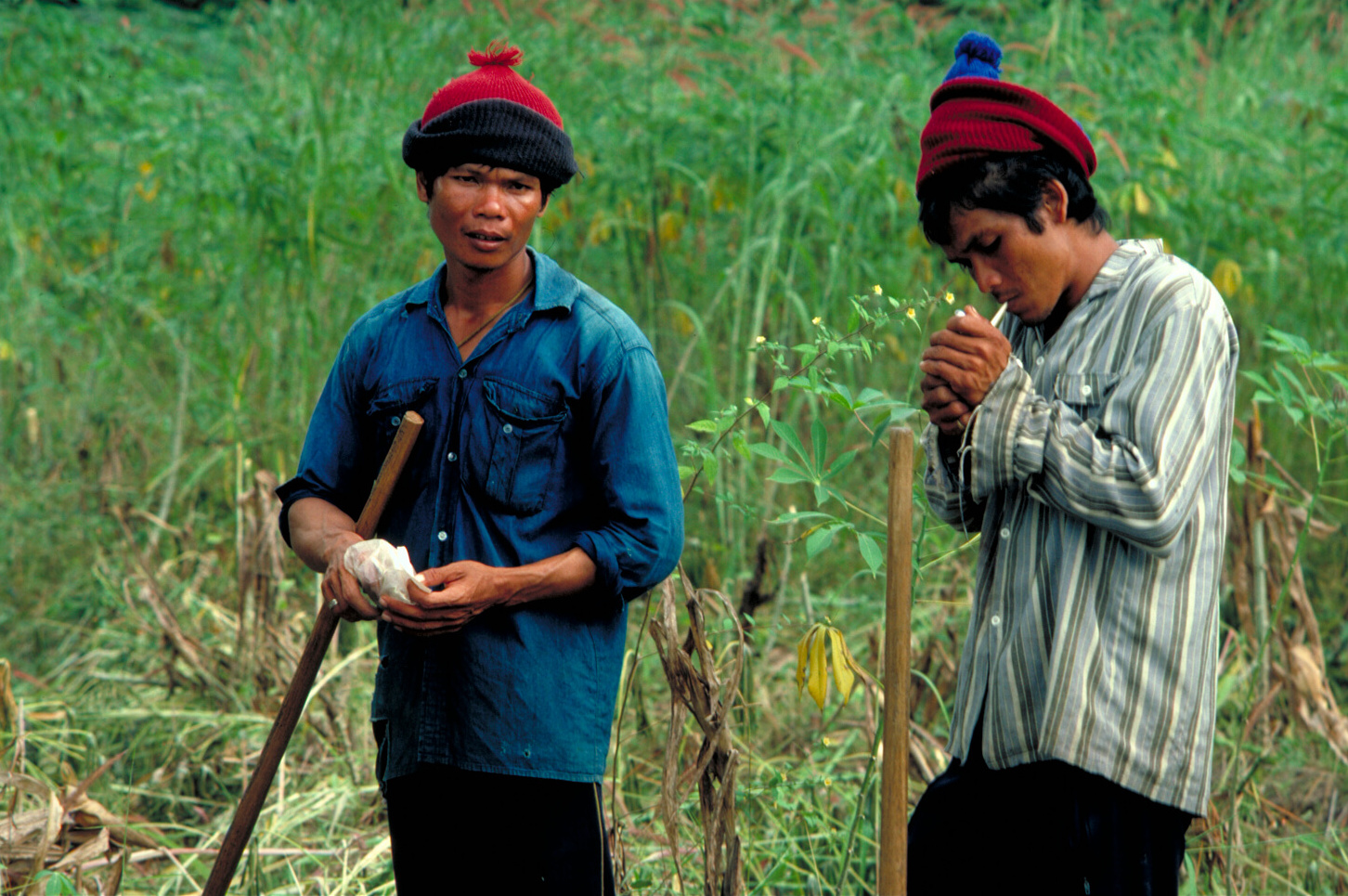
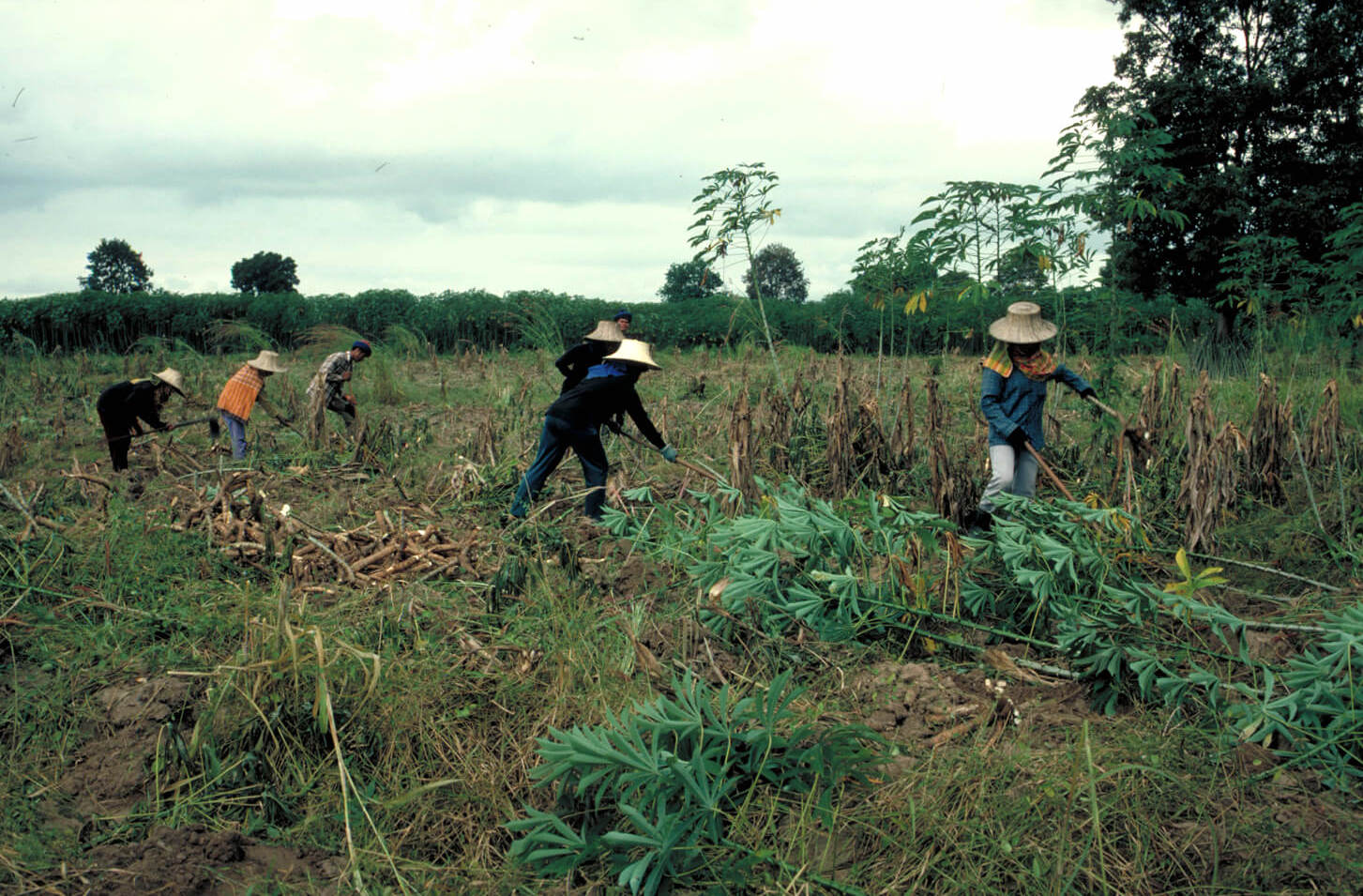
An ingenious hat
Breakfast put away, the women cover their faces with a cloth and put on their ngob, a straw hat that perches above their heads on a bamboo frame. Now their faces are protected from the dust and the sun, and the raised hat ingeniously allows air to circulate and cool their perspiring heads.
At home, Soan, a calm and cheerful man with the friendly and hospitable manners attributed to his northeast ancestors, sweeps under the house with a branch broom. While Kao cares for her chubby grandson Chacharin, Soan tears down an old shed. He will use the boards to fortify the pigs’ enclosure.
Prevent snakes from nestling in bed
The neigbour’s radio announces the time and Kanchai leaves for school. Kao, with Yukun by her side, ties up the mosquito net and rolls the mats. Everything is hung on the wo6den walls, to prevent snakes or insects from nestling in the beds and belongings.
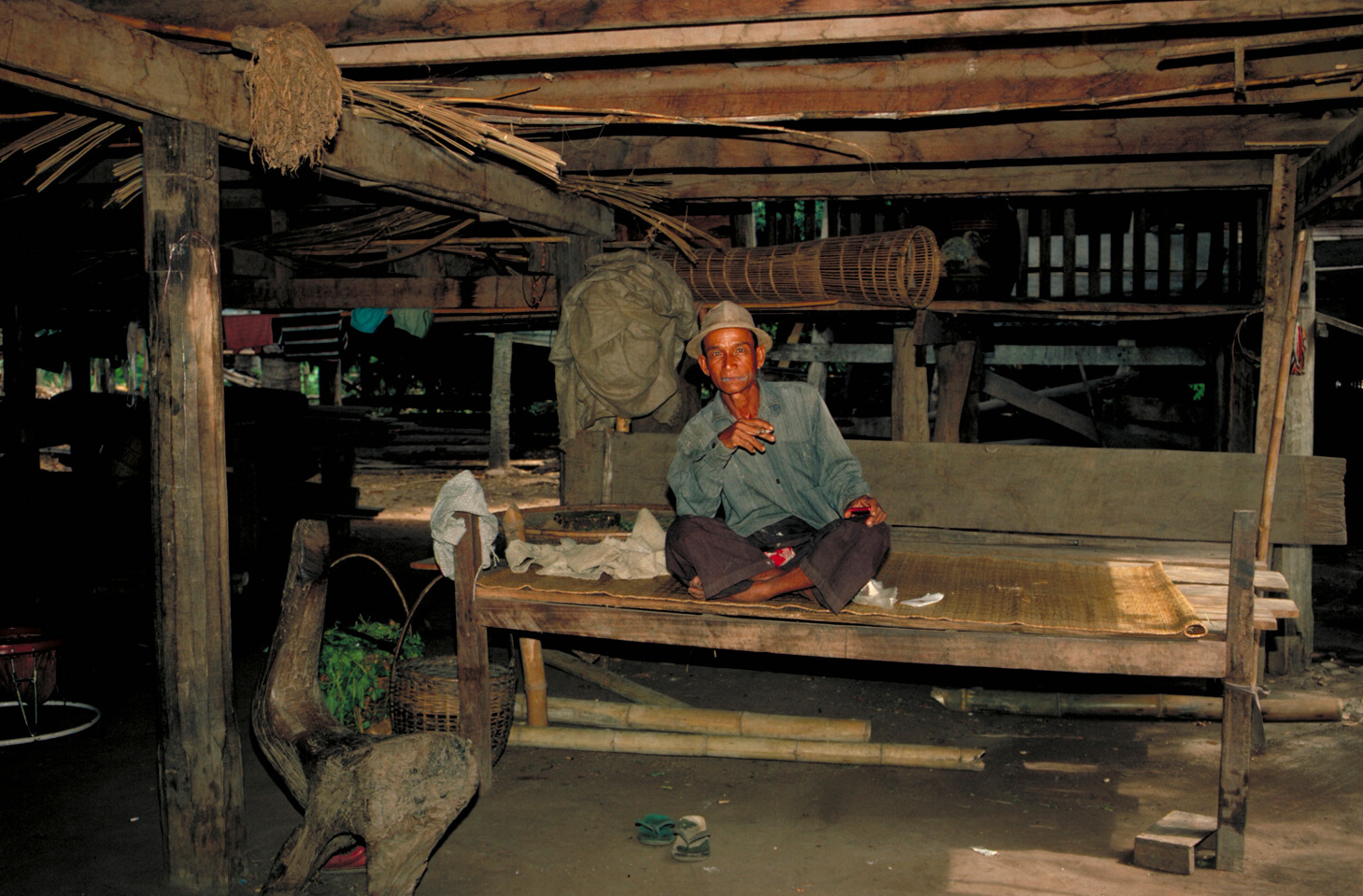
The grandfathers gather
11:30 Chacharin plays in his doting grandfather’s arms while Kao cooks a lunch of rice, cucumbers, pork and spicy sauce. Kao, Yukun and Soan will eat whenever they feel like it. Soan puts Chacharin in an infant walker and guides it under the next house, where all the grandfathers gather to pass the day out of the sun. All the people in the six houses that form the hamlet are related, or have been friends for so long they are said to be family.
At school, Kanchai finishes his lunch and sets out for a football game during recess. Above the children’s chatter and playful yelling comes the pounding of the looms at the workshop where the women weave the colourful cotton cloth they sell for cash. In the fields, the plastic cloths are once again laid down. Lunch is the same as breakfast.
Grandmother wins the struggle
3:00 Chacharin is again unhappy to be in his swinging cradle but Grandmother’s hand wins the struggle once more. Despite the rain this morning, Kao carefully waters her tobacco plants. Soan, al ways obliging, comes to rock his sleeping grandson and also prepares and cuts some green vegetables for the pigs. He chops in time with the cradle’ s rocking, the calm methodic rhythm punctuating the quiet afternoon.
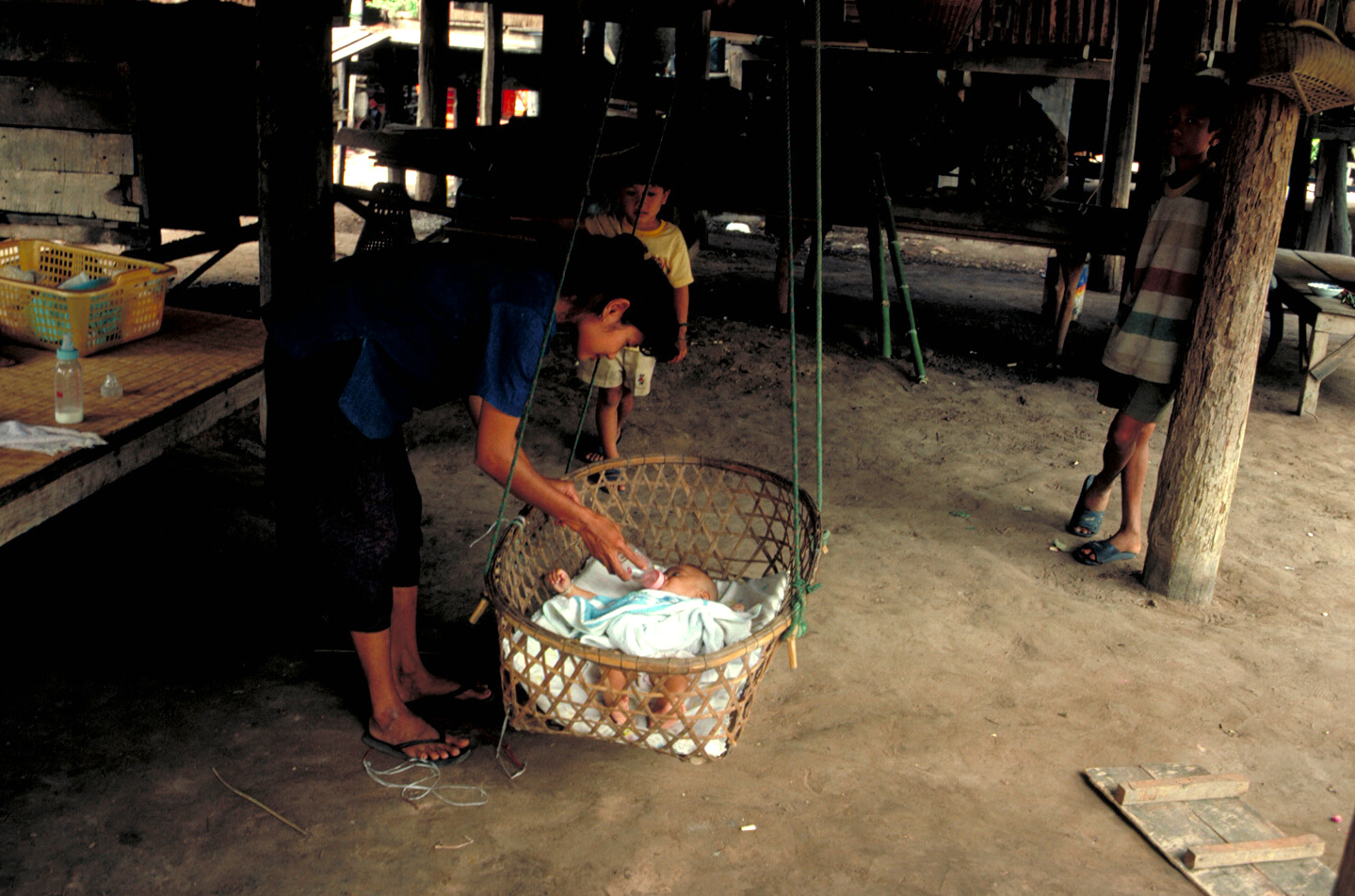
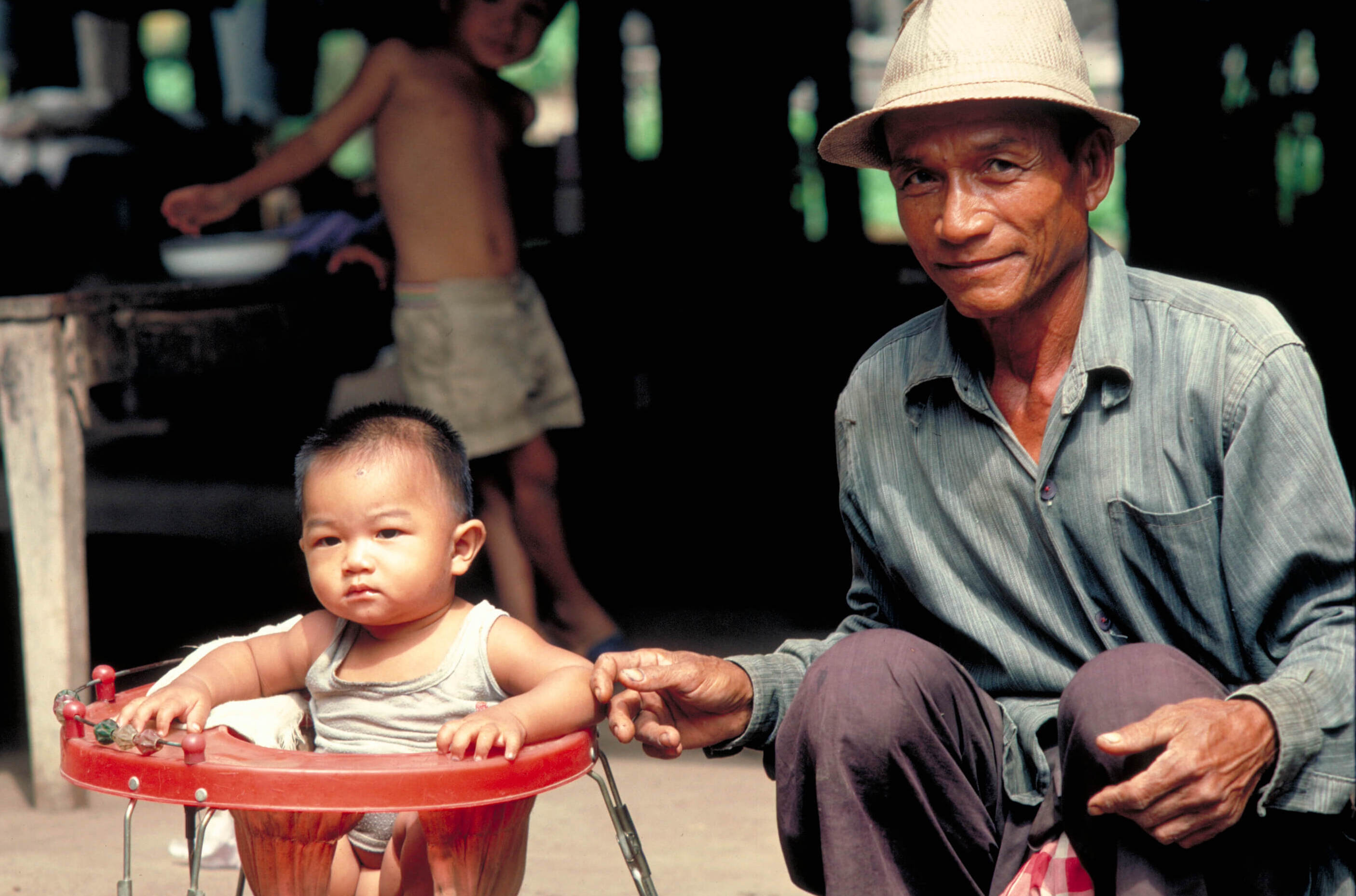
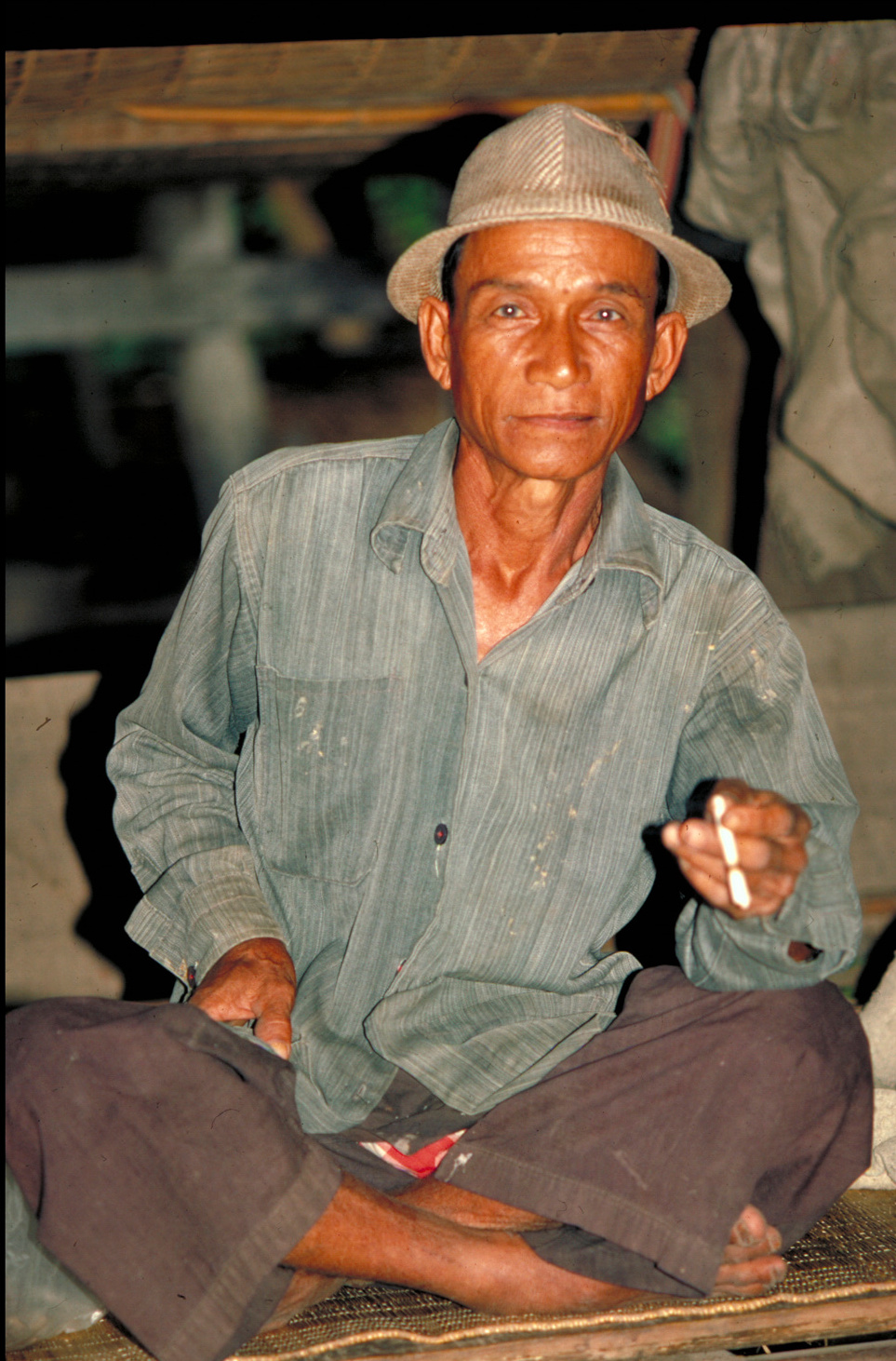
Compulsory service and army for the boys
3:30 Calm is never lasting. School finished, Kanchai runs up the steps to drop off his schoolbag, uniform and shoes. Yukun detaches himself from his grandmother’ s side and is off to join the youngsters, who now fill the hamlet. The parents hope the two boys will stay in the army after their compulsory service, because further education would be free and could lead to a profitable profession like medicine or engineering.
After fetching water to wash the midday dishes, Kao gets started on dinner. Squatting at the top of the stairs, she cleans a fish, throwing the entrails over the edge for the ducks and chickens to fight over.
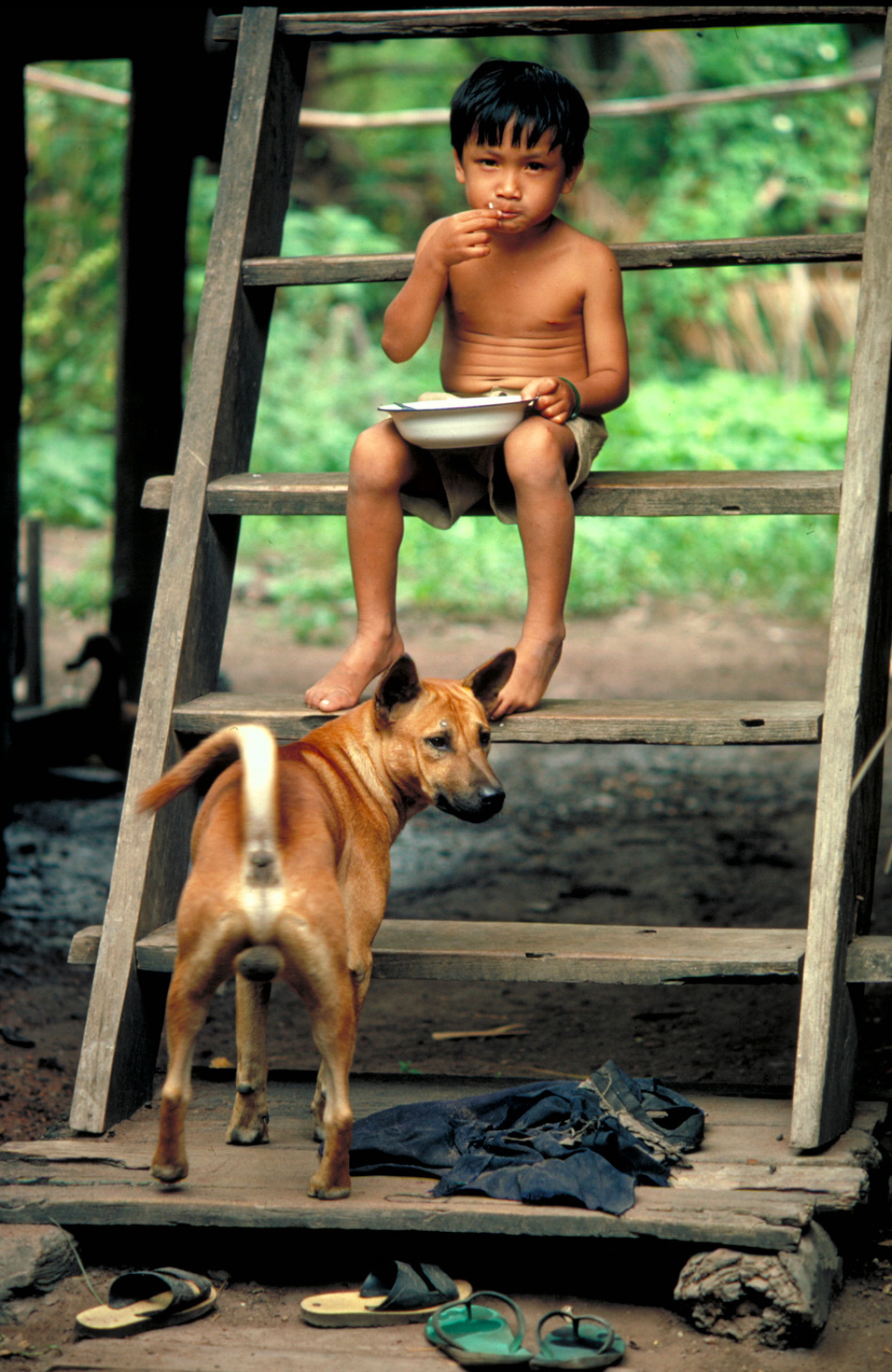
Many things they want to buy
5:00 Kao starts a charcoal fire, which she prefers to the small gas stove used mostly by her daughter. The family economises as much as it can, as there are many things they want to buy. Taptim would like to have a plastic mat to put under their sleeping area to keep the insects away; Get would like to have a car, Kao, a refrigerator. Everyone wants a television. But no one knows what this year’s savings will be. Even now, just a few days before harvest, the price the mills and middlemen will fix for the rice has not yet been determined.
Kao cooks all the dishes on a single fire. She sautés peanuts, puts them on a plate, and roasts the hot green peppers. Mashing both with anions and coarse sea salt, she makes nam-prik, a delicious spicy sauce, for the fish.
6:00 Taptim and Get are back from the fields and take turns showering. Refreshed, they dress and sit on the floor with their family, Taptim in her colourful sarong and handsome Get in his paakoama, the less colourful material men wrap around their waist like a skirt. Soan has the job of keeping Chacharin out of the plates that sit on the floor between them.
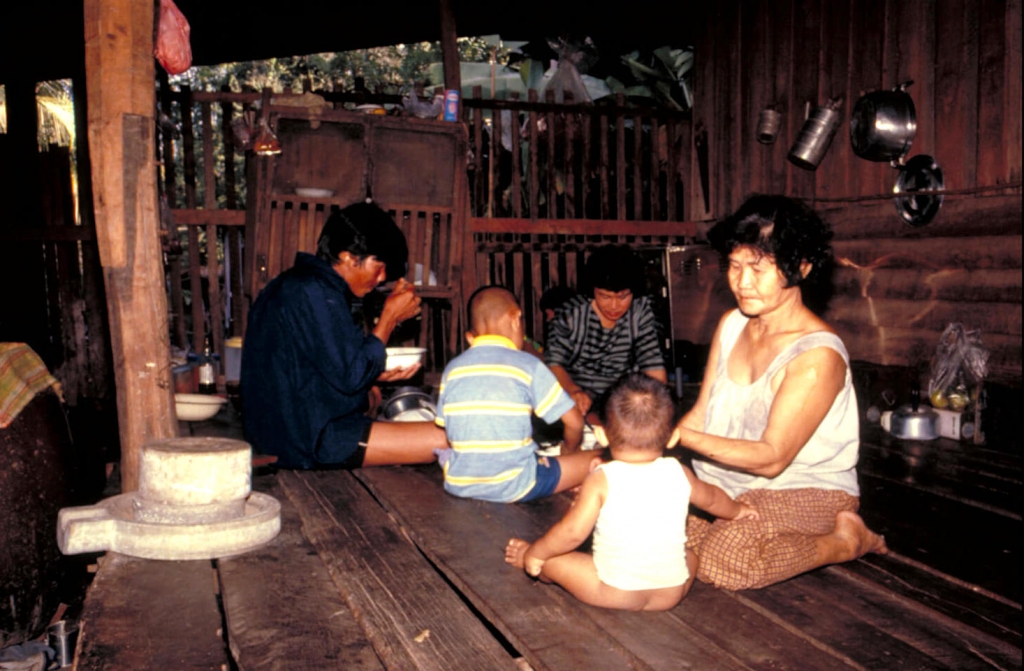
Moonlight through the gaps in the wooden planks
8:00 Kanchai and Yukun are bored by the conversation going on with an aunt and uncle who have come to sit on the doorstep. They are put to bed by their grandmother.
9:00 Chacharin’s bottle of powdered milk has been prepared and, dressed in a cloth nappie for the night, he falls asleep in his father’s arms. The young couple follows the elders’ example and crawl under their mosquito net. The moonlight filtering through the gaps in the wooden planks transforms the mosquito nets into two white shadowy rooms rising from the large space where the rats are now free to roam.
Personal wishes for a better karma
Let the rats play; a good night’s rest is needed. Tomorrow it is Loy Kratong, the Festival of Lights, celebrated since ancient times on the night of the first full moon after the rains stop. Kao will make little kratongs, banana-leaf boats, on which she will set small candles and offerings to the goddess of water. Und er tomorrow’ s full moon, they will all go to the pagoda and place their kratongs on the Mae Nam River. As they watch the hundreds of tiny flames float down the river, they will ask the goddess to pardon them for polluting her waters and make their personal wishes for a better karma.
